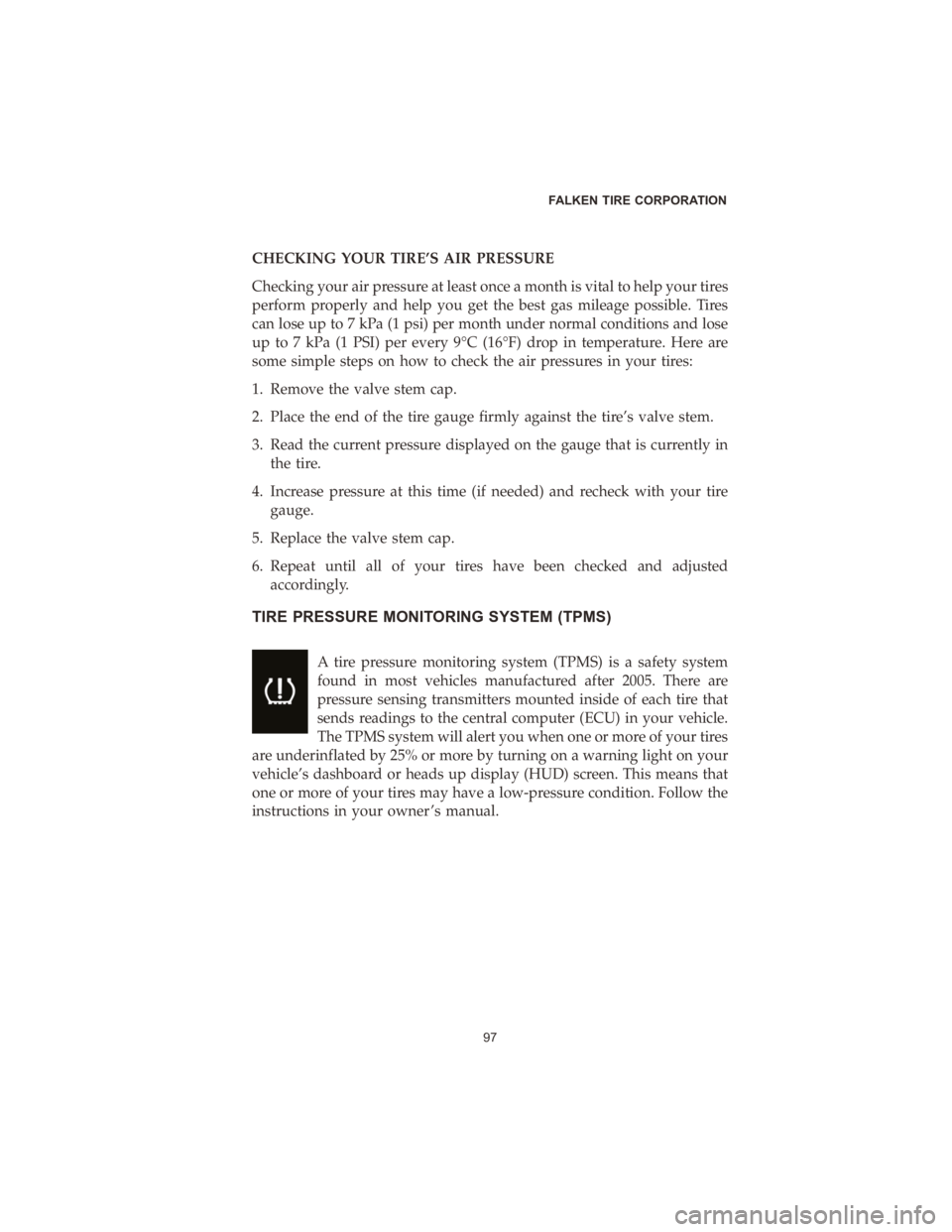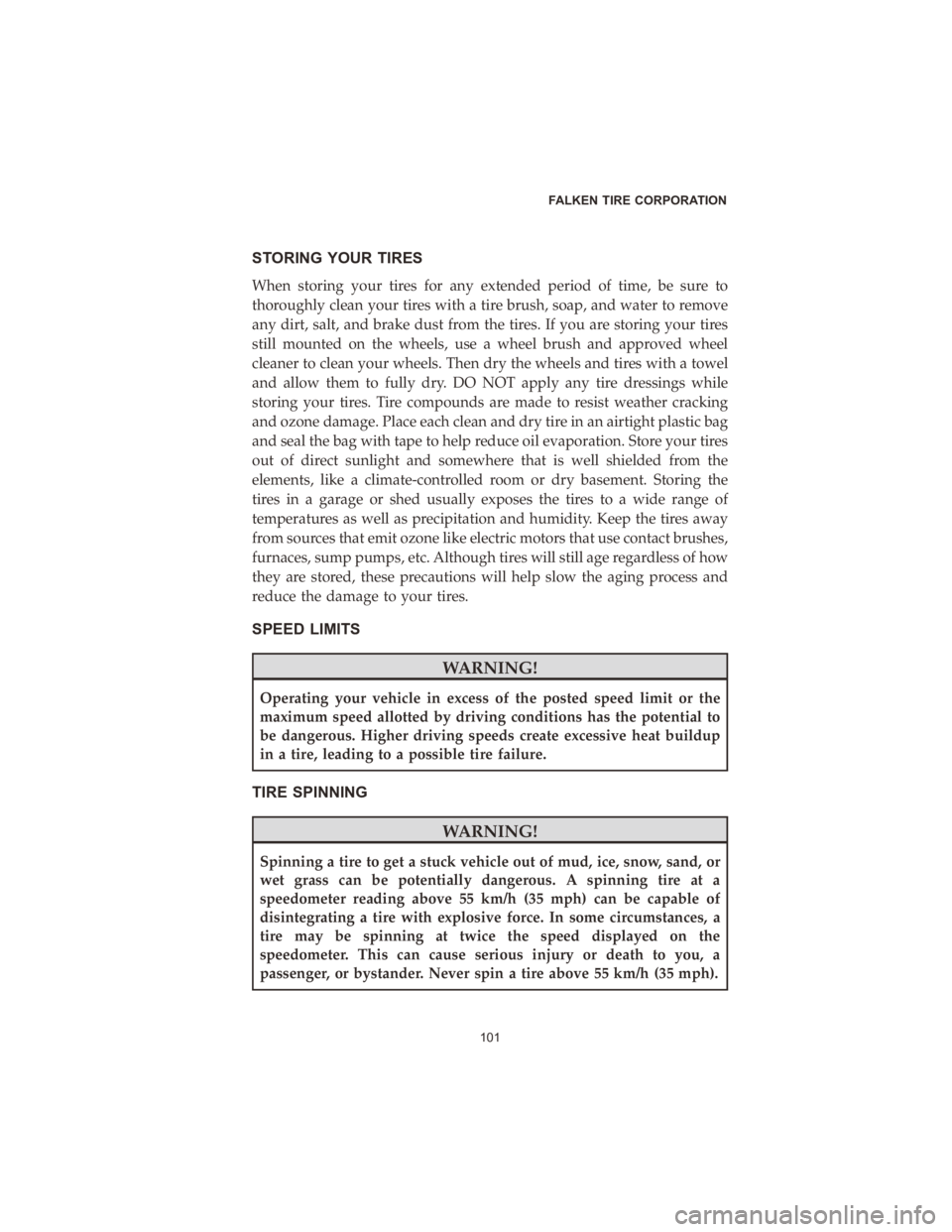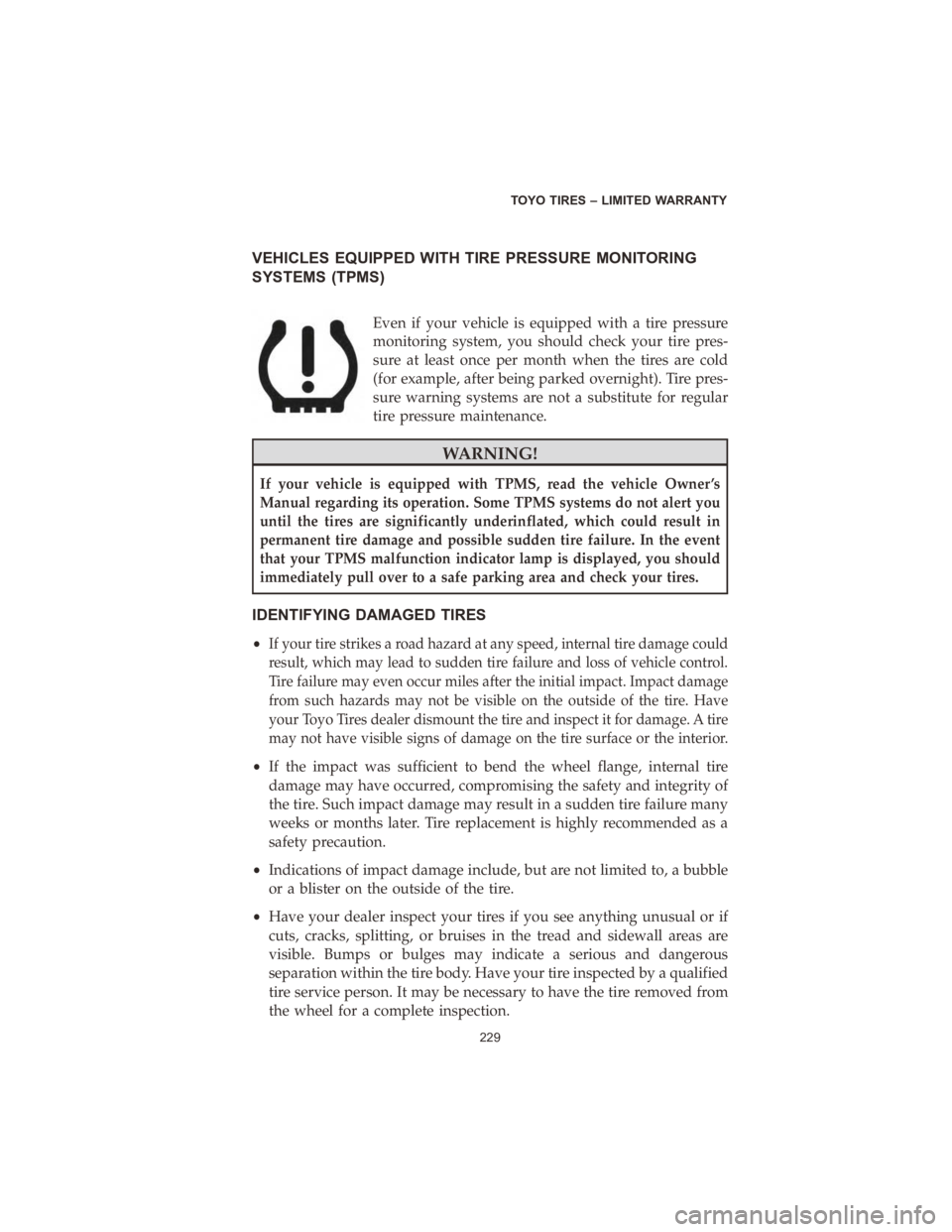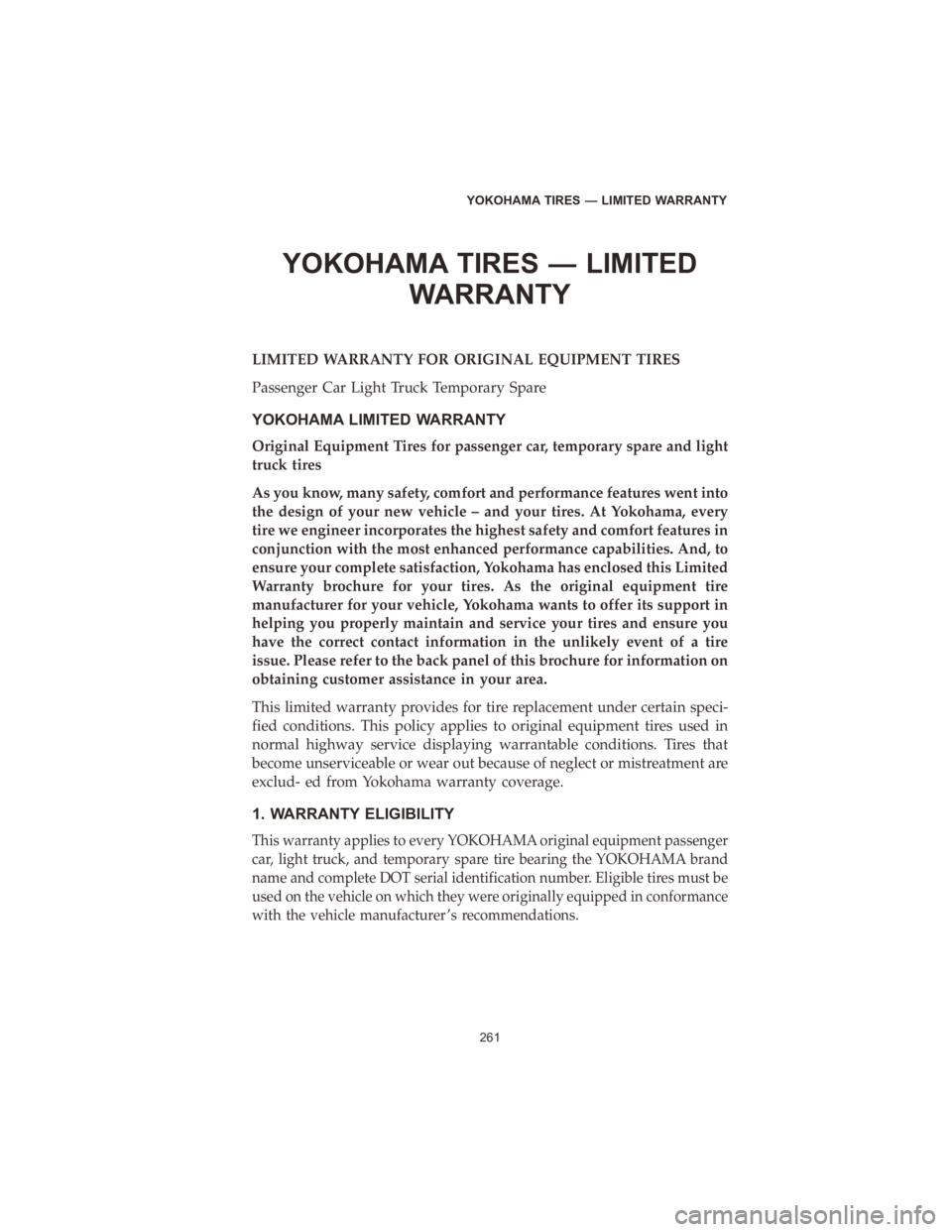display DODGE DURANGO 2020 Vehicle Warranty
[x] Cancel search | Manufacturer: DODGE, Model Year: 2020, Model line: DURANGO, Model: DODGE DURANGO 2020Pages: 270, PDF Size: 4.92 MB
Page 98 of 270

CHECKING YOUR TIRE’S AIR PRESSURE
Checking your air pressure at least once a month is vital to help your tires
perform properly and help you get the best gas mileage possible. Tires
can lose up to 7 kPa (1 psi) per month under normal conditions and lose
up to 7 kPa (1 PSI) per every 9°C (16°F) drop in temperature. Here are
some simple steps on how to check the air pressures in your tires:
1. Remove the valve stem cap.
2. Place the end of the tire gauge firmly against the tire’s valve stem.
3. Read the current pressure displayed on the gauge that is currently inthe tire.
4. Increase pressure at this time (if needed) and recheck with your tire gauge.
5. Replace the valve stem cap.
6. Repeat until all of your tires have been checked and adjusted accordingly.
TIRE PRESSURE MONITORING SYSTEM (TPMS)
A tire pressure monitoring system (TPMS) is a safety system
found in most vehicles manufactured after 2005. There are
pressure sensing transmitters mounted inside of each tire that
sends readings to the central computer (ECU) in your vehicle.
The TPMS system will alert you when one or more of your tires
are underinflated by 25% or more by turning on a warning light on your
vehicle’s dashboard or heads up display (HUD) screen. This means that
one or more of your tires may have a low-pressure condition. Follow the
instructions in your owner ’s manual.
FALKEN TIRE CORPORATION
97
Page 102 of 270

STORING YOUR TIRES
When storing your tires for any extended period of time, be sure to
thoroughly clean your tires with a tire brush, soap, and water to remove
any dirt, salt, and brake dust from the tires. If you are storing your tires
still mounted on the wheels, use a wheel brush and approved wheel
cleaner to clean your wheels. Then dry the wheels and tires with a towel
and allow them to fully dry. DO NOT apply any tire dressings while
storing your tires. Tire compounds are made to resist weather cracking
and ozone damage. Place each clean and dry tire in an airtight plastic bag
and seal the bag with tape to help reduce oil evaporation. Store your tires
out of direct sunlight and somewhere that is well shielded from the
elements, like a climate-controlled room or dry basement. Storing the
tires in a garage or shed usually exposes the tires to a wide range of
temperatures as well as precipitation and humidity. Keep the tires away
from sources that emit ozone like electric motors that use contact brushes,
furnaces, sump pumps, etc. Although tires will still age regardless of how
they are stored, these precautions will help slow the aging process and
reduce the damage to your tires.
SPEED LIMITS
WARNING!
Operating your vehicle in excess of the posted speed limit or the
maximum speed allotted by driving conditions has the potential to
be dangerous. Higher driving speeds create excessive heat buildup
in a tire, leading to a possible tire failure.
TIRE SPINNING
WARNING!
Spinning a tire to get a stuck vehicle out of mud, ice, snow, sand, or
wet grass can be potentially dangerous. A spinning tire at a
speedometer reading above 55 km/h (35 mph) can be capable of
disintegrating a tire with explosive force. In some circumstances, a
tire may be spinning at twice the speed displayed on the
speedometer. This can cause serious injury or death to you, a
passenger, or bystander. Never spin a tire above 55 km/h (35 mph).
FALKEN TIRE CORPORATION
101
Page 230 of 270

VEHICLES EQUIPPED WITH TIRE PRESSURE MONITORING
SYSTEMS (TPMS)
Even if your vehicle is equipped with a tire pressure
monitoring system, you should check your tire pres-
sure at least once per month when the tires are cold
(for example, after being parked overnight). Tire pres-
sure warning systems are not a substitute for regular
tire pressure maintenance.
WARNING!
If your vehicle is equipped with TPMS, read the vehicle Owner ’s
Manual regarding its operation. Some TPMS systems do not alert you
until the tires are significantly underinflated, which could result in
permanent tire damage and possible sudden tire failure. In the event
that your TPMS malfunction indicator lamp is displayed, you should
immediately pull over to a safe parking area and check your tires.
IDENTIFYING DAMAGED TIRES
•If your tire strikes a road hazard at any speed, internal tire damage could
result, which may lead to sudden tire failure and loss of vehicle control.
Tire failure may even occur miles after the initial impact. Impact damage
from such hazards may not be visible on the outside of the tire. Have
your Toyo Tires dealer dismount the tire and inspect it for damage. A tire
may not have visible signs of damage on the tire surface or the interior.
•If the impact was sufficient to bend the wheel flange, internal tire
damage may have occurred, compromising the safety and integrity of
the tire. Such impact damage may result in a sudden tire failure many
weeks or months later. Tire replacement is highly recommended as a
safety precaution.
• Indications of impact damage include, but are not limited to, a bubble
or a blister on the outside of the tire.
• Have your dealer inspect your tires if you see anything unusual or if
cuts, cracks, splitting, or bruises in the tread and sidewall areas are
visible. Bumps or bulges may indicate a serious and dangerous
separation within the tire body. Have your tire inspected by a qualified
tire service person. It may be necessary to have the tire removed from
the wheel for a complete inspection.
TOYO TIRES – LIMITED WARRANTY
229
Page 262 of 270

YOKOHAMA TIRES — LIMITEDWARRANTY
LIMITED WARRANTY FOR ORIGINAL EQUIPMENT TIRES
Passenger Car Light Truck Temporary Spare
YOKOHAMA LIMITED WARRANTY
Original Equipment Tires for passenger car, temporary spare and light
truck tires
As you know, many safety, comfort and performance features went into
the design of your new vehicle – and your tires. At Yokohama, every
tire we engineer incorporates the highest safety and comfort features in
conjunction with the most enhanced performance capabilities. And, to
ensure your complete satisfaction, Yokohama has enclosed this Limited
Warranty brochure for your tires. As the original equipment tire
manufacturer for your vehicle, Yokohama wants to offer its support in
helping you properly maintain and service your tires and ensure you
have the correct contact information in the unlikely event of a tire
issue. Please refer to the back panel of this brochure for information on
obtaining customer assistance in your area.
This limited warranty provides for tire replacement under certain speci-
fied conditions. This policy applies to original equipment tires used in
normal highway service displaying warrantable conditions. Tires that
become unserviceable or wear out because of neglect or mistreatment are
exclud- ed from Yokohama warranty coverage.
1. WARRANTY ELIGIBILITY
This warranty applies to every YOKOHAMA original equipment passenger
car, light truck, and temporary spare tire bearing the YOKOHAMA brand
name and complete DOT serial identification number. Eligible tires must be
used on the vehicle on which they were originally equipped in conformance
with the vehicle manufacturer ’s recommendations.
YOKOHAMA TIRES — LIMITED WARRANTY
261